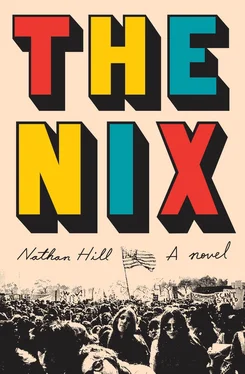“Wow. You have a whole system.”
“Of course, eating these food items is not what I might describe as pleasant, since they’re tough and scorched and moistureless from their all-day cooking on high-temperature rollers. Sometimes biting through a burrito’s thick tortilla casing can feel like chewing through your own toe calluses.”
“That’s an image that’s going to linger.”
“But it’s cheap, you know? And given my current level of income, which is, frankly, minimal since I lost my job, and also my unemployment checks are due to run out in like three months or so, right about the time I’ll be seeing real results, waistline-wise, of the new diet. And if I have to start eating bad cheap food then because the money is gone, well, it would be a momentum-stopping blow, I just know it. So I have to make the diet financially viable and sustainable long-term, which is why it’s important to not eat healthy right now in order to save up for the time I will be eating healthy. Get it?”
“I think so.”
“Every week I eat cheap shitty things, like nachos, is a week I can tick like seventy bucks to the other side of my mental ledger as cash ‘saved’ for my new life. This plan is going very well so far.”
There seemed to be a not-rightness about him, a sense of disorder and exotic illness. His features were off in a way Samuel could not immediately put his finger on, like he suffered from some long-eradicated disease — scurvy, maybe.
Their drinks came. “Cheers,” said Pwnage. “Welcome to Jezebels.”
“This place,” Samuel said. “Seems like there’s a story here.”
“Used to be it was a strip club,” Pwnage said. “Then the strippers stopped coming because the mayor banned alcohol at strip clubs, then banned lap dances at strip clubs, then banned strip clubs.”
“So now it’s more of a bar with a strip-club theme?”
“That’s right. He was a strict disciplinarian, the mayor. Elected in a last-ditch fit of anger when the city started going downhill.”
“You’ve been coming here a long time?”
“Not when it was a strip club,” Pwnage said, and he held up his hand to show Samuel his wedding ring. “She doesn’t really support strip clubs, my wife. Because of the patriarchy and stuff.”
“That’s sound.”
“How strip clubs are degrading to feminists and all that. Oh, hey, I love this song.”
He was talking about Molly Miller’s new single, the video to which had now begun on roughly one-third of the televisions in the bar: Molly singing in an abandoned drive-in movie theater where scores of good-looking young people had parked their cars, their late-sixties or early-seventies American muscle cars — Cameros, Mustangs, Challengers — in what was one example of the odd dislocation and ambiguity Samuel felt watching this video and processing its many props. The abandoned state of the drive-in spoke to a present-day setting, while the automobiles were forty years old and the mic Molly sang into was one of those chunky metal things that radio people used in the thirties. Meanwhile, her wardrobe appeared to be a hip, ironic nod to eighties fashion, most obviously in the form of large white plastic sunglasses and skinny jeans. It was a large ever-shifting referential stew of anachronistic symbols with no logical connection between them except their high cool quotient.
“So why did you want to meet?” Pwnage said, returning to his normal sitting position, his feet tucked beneath him.
“No reason,” Samuel said. “Just wanted to hang out.”
“We could have done that in Elfscape. ”
“I suppose.”
“Actually, come to think of it, this is the first time I’ve hung out with someone not in Elfscape in a very long time.”
“Yeah,” Samuel said, and he considered this for a moment, and felt a little unsettled that this was also true for him. “Do you think it’s possible that we play Elfscape too much?”
“No. But yeah, maybe.”
“I mean, think about all the hours we spend on Elfscape, all the cumulative hours. And not only the hours spent playing but also the hours reading about playing and watching videos of other people playing and talking and strategizing and getting on discussion boards and such. It’s so much time. Without Elfscape we could all be, I don’t know, leading meaningful lives. Out in the real world.”
The nachos came in what looked like a lasagna pan. A corn-chip mound covered in ground beef and bacon and sausage and steak and onions and jalapeños and probably a couple of full pints of cheese, this bright orange cheese that looked thick and shiny and plastic.
Pwnage dove into the dish, then said, between bites, nacho shrapnel clinging to his lips, “I find Elfscape way more meaningful than the real world.”
“Seriously?”
“Absolutely. Because, listen, what I do in Elfscape matters. Like, the things I do affect the larger system. They change the world. You cannot say this about real life.”
“Sometimes you can.”
“Rarely. Most of the time you can’t. Most of the time there’s nothing you can do to affect the world. Like, okay, almost all my friends in Elfscape work retail in real life. They sell televisions or pants. They work in a mall. My last job was at a copy shop. Explain to me how that’s going to change the larger system.”
“I don’t think I can accept that a game is more meaningful than the real world.”
“When I lost my job, they told me it was because of the recession. They couldn’t afford so many employees. Even though that same year the CEO of the company got a salary that was literally eight hundred times bigger than mine. In the face of something like that, I’d say sinking into Elfscape is a pretty sane response. We’re fulfilling our basic human psychological need to feel meaningful and significant.”
The nachos were lifted to Pwnage’s mouth still tethered to the plate by strings of orange slime. He scooped up as much cheese and meat as each chip could maximally accommodate. He wouldn’t even finish chewing the last bite before taking the next one. It was like he had some kind of conveyor-belt system going on in there.
“If only the real world operated like Elfscape, ” Pwnage said, chewing. “If only marriages worked that way. Like every time I did something right I earned man points until I was a grand-master level-hundred husband. Or when I was a jackass to Lisa I’d lose points and the closer I was to zero the closer I’d be to divorce. It would also be helpful if these events came with associated sound effects. Like that sound when Pac-Man shrivels up and dies. Or when you bid too high on The Price Is Right. That chorus of failure.”
“Lisa’s your wife?”
“Mm-hm,” Pwnage said. “We’re separated. But actually more accurately we’re divorced. For the time being.” He looked at his wedding ring, then up at the video, watching its swirl of disassociated images: Molly in a classroom; Molly cheering at a high-school football game; Molly at a bowling alley; Molly at a high-school dance; Molly in a grassy field having a picnic with a cute boy. The producers had obviously targeted the teen and tween demographic, and were blatantly rolling around in their idiom as dogs do on rotten food.
“When Lisa and I were married,” Pwnage said, “I thought everything was great. Then one day she said she was no longer satisfied with our relationship and boom, divorce papers. She just left one day, no warning.”
Pwnage scratched at a spot on his arm so heavily scratched-at that he’d left a threadbare spot on his shirtsleeve.
“That would never happen in a video game,” he said. “Being surprised like that. In a game, there’s immediate feedback. In a game, there would be a sound effect and a graphic of me losing man points whenever I did whatever I did to make her want to divorce me. Then I could have apologized right away and never done it again.”
Читать дальше












